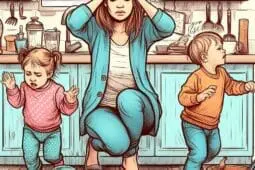Children
Do I Have to Forgive to Heal?
Examining the Role of Forgiveness in Trauma RecoveryWhat does it mean to forgive, anyway? And do trauma survivors really need to forgive their abusers in order to heal? Read more
The Myth of the Perfect Parent
Helping Clients Overcome Shame and Accept ImperfectionWe all know that there’s no such thing as a “perfect” parent, but even so, many parents hold themselves to unreasonably high standards. Read more
Is Climate Change an ACE?
The Global Neglect of Our Children’s FutureHow do we empower kids in the midst of big environmental challenges? Read more
The Dangers of a Phone-Based Childhood
Are We Protecting Kids in the Wrong Way?What happens when a whole generation of children are overprotected on the playground and underprotected online? Read more
Families Under Pressure
Helping Relieve Today’s Parents & KidsThe pandemic has created an emotional petri dish for kids and parents who are stuck in place, terribly stressed, and feeling alone. How are families supposed... Read more
Bridging the Gap
School–Therapy Collaboration in Trying TimesAlthough it’s never been easy to take oh-so-familiar systems principles and put them to work in real life, the devastating sweep of the pandemic has made... Read more
Rethinking Anger
The Bioenergetic Therapy ApproachToo often, therapists working with anger focus on controlling and preventing it, rather than finding constructive ways to use it. Bioenergetic therapy regards... Read more
An Awareness of the Soul
What Does It Mean to Really Get in Touch with Yourself?When I was 5 years old, I experienced something that made me feel viscerally, mentally, emotionally, and inescapably connected to everything and everyone... Read more
Leaping for Joy
The Secret Lives of ChildrenRecalling a time when kids were supposed to be out of the house—and their parents’ hair—as much as possible. Read more
Working Through the Childhood Wounds that Feed Depression
Judith Beck on Understanding Emotions IntellectuallyJudith Beck talks about an intellectual technique that she uses when doing childhood work with adult clients suffering from depression. Read more
The Power of Secure Attachment
Offering Deep Relatedness from the Very First SessionDiane Poole Heller, an expert in trauma and attachment, on helping clients find their way back to meaningful, safe relationships. Read more
Going, Going, Gone
A young boy finds his Charon for the final journeyAn ill child finds his place among a group of other boys in aging men's bodies. Read more










